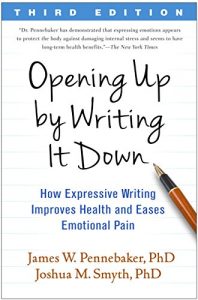What types of disclosure lead to integration and healing? The book Opening Up By Writing It Down: How expressive writing improves health and eases emotional pain by James Pennebaker and Joshua Smyth describes the ways in which writing and other forms of disclosure are beneficial.
Their research confirms that inhibiting by deliberately choosing not to share our thoughts and feelings takes work. In contrast, deliberately choosing to share allows us to confront and acknowledge our experiences. Just venting what is going on is not sufficient, but must be combined with shifts in awareness around your experiences. Higher-level, deep, complex, and reflective thoughts are associated with better health than a lower-level organization.
When does opening up work?
Merely writing about superficial content or feelings, or trauma facts alone does not provide a health benefit. Indeed, focusing on emotion alone can make you feel worse. However, writing about both deep thoughts and feelings gave relief, understanding, resolution, distance, and perspective. These findings are supported experimentally by the use of disclosure to successfully cope with a variety of traumas from holocaust PTSD, to job loss, to a volcanic eruption. For each case, those who disclosed effectively had, less thought intrusion, were more successful finding new work and had less concern about a recurring tragedy.
Paradoxically, attempting to inhibit unwanted painful thoughts actually exacerbates them. This inhibition affects short-term biological changes and long-term health. When you have no control over your situation, low-level thinking can support coping. However, it also reduces the ability to problem-solve. It is better to confront unwanted thoughts directly even if it is uncomfortable. This discomfort is often evident from a change in voice tone and speed or writing style as trauma content is disclosed.
When students recorded themselves for just a few minutes speaking about the most traumatic experience of their lives. Those who were high disclosers and shared both thoughts and feelings showed a sustained drop in blood pressure 6 weeks later. Another study also showed that writing about the stress of joining college improved subsequent immunity and GPA.
It can even help you get to sleep. High-level anxious thinking last thing at night can cause insomnia, but confronting these thoughts through verbal expression allows you to drift off.
The impact of opening up depends on the extent to which you already implement effective coping mechanisms or disclose effectively.
Why does opening up work?
Inhibiting our responses is not good for our health. It undermines our bodies’ defense and causes stress. Conversely, confronting our deepest thoughts and feelings reduces our anxiety through what appears to be a combination of catharsis and insight.
Disclosure serves our search for meaning, completion, and resolution. It allows organization and simplification reducing demand on mental resources. In contrast, inhibition prevents the high-level thinking required to organize thoughts.
The left part of the brain primarily activates with language processing and the right with negative emotion. Disclosure brings brain wave congruence such that the right and left parts of the brain show similar activation. These improvements also correlate with a shift to a coherent organized story.
Choices for opening up
Social disclosure will change the nature of your relationship and can cause social isolation. This is because others sometimes cannot deal with the pain of what is shared. The listener is especially impacted when they don’t see any solution to your outcomes and may avoid or judge you because of your experiences. Some disclosures are more socially acceptable than others. Taboo topics include bulimia, sexual abuse, divorce, or the death of a child. Support groups or writing may be preferable over choosing a confidant in these cases. The need to be able to trust the listener and not be judged means that it is sometimes easier to disclose to a stranger whom we will never see again. Recording yourself or engaging in prayer are also options for opening up.
It is not enough to express yourself creatively with artwork, body movement, or music alone, you have to engage with deep thoughts and feelings. This means when engaging with these creative therapies select the ones that engage and release feelings as well as entering into a discussion after bonding with this shared experience.
Positive changes, such as having a child, being promoted, or getting married, can also create stress and carry similar health implications as a traumatic experience. This means it is also helpful to disclose any change you are going through.
This information is super important to coaches. It emphasizes asking questions that allow the client to explore their deepest thoughts together with their feelings. It also provides a powerful tool to further growth outside of the coaching partnership.
Image by Darkmoon_Art from Pixabay

